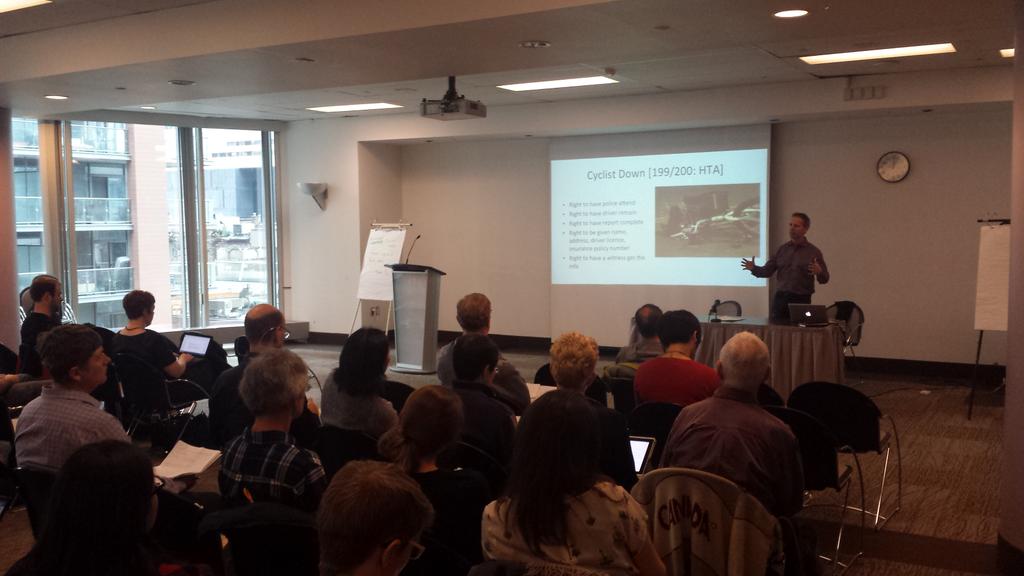 |
| Patrick Brown at the 2015 Skill Swap (SOURCE: Cycle Toronto) |
PB: While I have always done cases involving cyclists, my work started to focus more on them in 2003. It was through my clients that I was encouraged to go into cycling advocacy in 2007. I am a founding member of Cycle Toronto (formerly Toronto Cyclists Union) when it started in 2008 and was also involved with the Advocacy for Respect of Cyclists (ARC). Through ARC, I contributed with written material, the Wiki page, and legal advice.
RZ: How has cycling culture and advocacy evolved since then?
PB: When I started getting involved, advocacy had to be more radical because the message fell on deaf ears, though the radical element still exists. The cases then were more individual such as with the 1998 Coroner’s Report.
Over the past six years, cycling advocacy has become more organized with more people involved, more collaboration with pedestrians, and increased success. A cultural shift occurred in which the Ontario Ministry of Transportation and the City of Toronto’s Transportation Services division became more bike-friendly. The cycling community covers a larger spectrum including recreational cyclists.
RZ: Throughout your career, what have you found to be the main misconceptions regarding cyclists and the law?
PB: The biggest misconception is we have a legal system which deters drivers from careless and negligent behaviour in their cars. In reality, drivers get a slap on the wrist when a cyclist gets killed. They are not required to show in court and the fines are grossly and shamefully low if they do get convicted. Any damages a driver causes, including legal, get covered by their insurance company.
There is also the misconception of cyclists not being deterred from bad behaviour when have the most significant deterrent, which is death. Even if a cyclist does not get killed, the injuries they can experience (e.g. brain injury) are significant and may result in them not being able to work again or play with their children.
RZ: You worked with Albert Koehl on the June 2012 Ontario Coroner’s Report.[1] What were the implications of the report’s findings?
PB: Koehl and I approached the Coroner’s office in 2011 in order to get an independent third party to review cycling deaths and find ways to advance cyclists’ issues. We represented a coalition of groups including Cycle Toronto, ARC, 8-80 Cities, Hoof and Cycle, United Senior Citizens of Ontario (USCO), and the Toronto Centre for Active Transportation. Over the course of one and a half years, we brainstormed ideas and developed several recommendations, some of which have since been approved or are in progress. These include a complete streets policy, lower speed limits, the one metre passing rule, cycling education, infrastructure funding, and paved shoulders. We were disappointed with Queen’s Park leaving truck side guards to the federal government.
One of the more controversial recommendations was mandatory helmet legislation, which our coalition opposed. We did, however, agree with the coroner that a full review was needed to prove the difference helmets made in the number of cycling deaths. A recent University of British Columbia study[2] indicated helmets did not decrease the number of injuries and confirmed infrastructure funding is key.
RZ: You also worked on bringing Vulnerable Road User (VRU) legislation to Ontario.[3] What is the project’s current status?
PB: A coalition of groups including Cycle Toronto, ARC, Toronto Bicycle Network, Walk Toronto, and Kids at Play is involved in calling for VRU legislation. Jared Kolb (Cycle Toronto’s executive director) asked for research into fines. Since there were no real statistics, I cross-referenced information from my own cases and discovered drivers received low or no fines for killing pedestrians and cyclists, which must change.
VRU legislation requires the driver attend court to hear victim impact statements, pay higher fines, and perform community service work relating to road safety. The USCO representing 200,000 senior citizens passed a resolution supporting this, as did almost every Toronto city councillor. While ten US states currently have VRU legislation, there has been a negative response from Queen’s Park and we are meeting with the coalition to discuss next steps.
RZ: What final message do you have for cyclists regarding their legal rights?
PB: Cyclists have the right to be treated equally under the law on roadways. They, along with drivers, have a joint responsibility to look after each other and respect both sides. While there have been some positive steps, existing laws do not address cycling issues.
 | |
| Fallen cyclists - the focus of the 2012 Coroner's Report Brown was involved with - are remembered with these ghost bikes |
Ride safe!
Rob Z (e-mail)
Follow @RZaichkowski
---
[1] The full report can be consulted at
http://www.mcscs.jus.gov.on.ca/english/DeathInvestigations/office_coroner/PublicationsandReports/CyclingDeathReview/DI_Cycling_Death_Review.html.
[2] CBC News. "Bike helmet laws have little effect reducing head injuries, says UBC study." November 6, 2015. http://www.cbc.ca/news/canada/british-columbia/bike-helmet-laws-have-little-effect-reducing-head-injuries-says-ubc-study-1.3308238.
[3] David Shum. Global News. "Coalition calling on Ontario to bring in vulnerable road user law." September 10, 2015. http://globalnews.ca/news/2212646/coalition-calling-on-ontario-to-bring-in-vulnerable-road-user-law/.
No comments:
Post a Comment